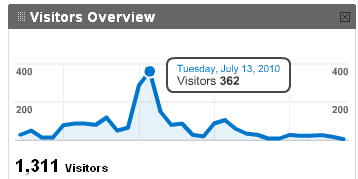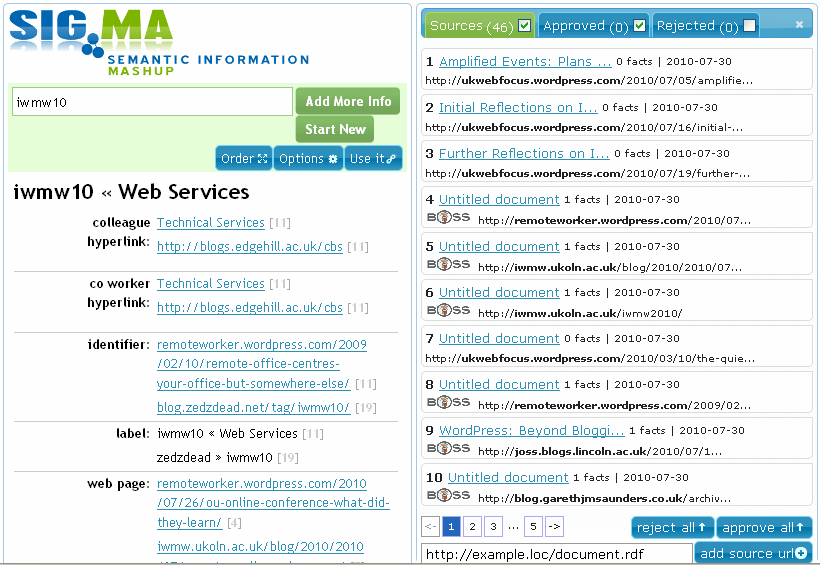The IWMW events have always sought to provide an opportunity for experimentation on various aspects with emerging new Web technologies. In the past couple of years we have encouraged use of Twitter to support discussions at the event. Whilst the use of a Twitter event back channel may no longer be regarded as innovative (although the event may provide an opportunity for those who haven’t yet used Twitter to explore its potential) the use of semantic tweets is a relatively new concept.
I first came across the concept of using lightly structured tweets to support an event at the WWW 2010 conference in a paper on “Real-time #SemanticWeb in <= 140 chars” (available in PDF format) presented by Joshua Shinavier in the Linked Data on the Web 2010 workshop. Joshua provided a demonstration of use of this approach at the conference. As he has described his demonstration is “based on TwitLogic, an aggregating service capable of collecting user-contributed semantic nanotations from Twitter“.
He provided the following summary of how to use the service at the Linked Data on the Web workshop which was co-located with the WWW 2010 conference (for which the conference hashtags were #ldow2010 and #www2010)
… open up your favorite Twitter client to write down whatever you want to say about this WWW 2010 conference, or about any subevents of it. As a LOD enthusiast, you might want to tweet about this LDOW workshop:
#LDOW2010 (part of #www2010) is about to start, expecting a bunch of great presentations!
You migt also want to tweet about a particular talk:
Next will be @joshsh talking about #TwitLogic (see http://bit.ly/aOnQb7). #ldow10 (ie #ldow2010)
TwitLogic understands your tweet, extracts the embeded structured data, processes them to generate RDF streams and finally, your tweets appear in our demo, becoming part of the real-time view of the LDOW workshop!
Joshua has kindly agreed that his service can be used to aggregated the #iwmw10 tweets, thus provided a Linked Data representation of the discussions on the Twitter back channel at this year’s event.
In order to provide the initial content for the service I have tweeted the following factual sumamries about the event. Initially I described the event using a syntax which should be understandable by both humans and software:
The Web site for #iwmw10 (homepage http://iwmw.ukoln.ac.uk/iwmw2010/)
I then provided links between the various plenary talks,the speakers and the details on the Web site:
Welcome session at #iwmw10 is by @mariekeguy and @briankelly #P0 (homepage http://iwmw.ukoln.ac.uk/iwmw2010/talks/welcome/)
Welcome session #P0 (partof #iwmw10)
Biographical details for @briankelly (homepage http://iwmw.ukoln.ac.uk/iwmw2010/speakers/#kelly) #iwmw10
Plenary talk #P1 by @cloggingchris (homepage http://iwmw.ukoln.ac.uk/iwmw2010/talks/sexton/) (partof #iwmw10)
I also provided links to my interests and key resources:
Blog for @briankelly (homepage http://ukwebfocus.wordpress.com/) #iwmw10
@briankelly is based at UKOLN (hompage http://ww.ukoln.ac.uk/) #iwmw10
Interests of @briankelly (studies Web2.0) (studies Standards) (studies Accessibility) #iwmw10
Joshua’s software processes tweets containing the #iwmw10, analyses the tweets and parses the structure and stores this Linked Data in RDF. A Linked Data visualisation tool can then be used to browse through this structured resource.
If you would like to join in, you can post your tweets with the #iwmw2010 using the syntax defined in the Syntax Convention and illustrated above. Note that the Twitter aggregation software is following Twitter users which are listed on the iwmw10facilitator, iwmw10facilitator or iwmw10participant (or iwmw10remote) list – so if you wish your event tweets to be included as semantic tweets please let us know so that we can add you to the appropriate group.
Our intention is to provide a demonstration of the results on the final morning of the IWMW 2010 even, between 11:30 and 12:30 on Wednesday 14 July.
 “>
“>
 But how many visitors came to the blog?
But how many visitors came to the blog?


